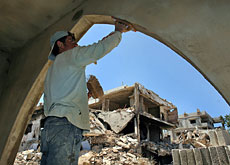
Lebanon teeters on the brink once again

Lebanon's Prime Minister Fouad Siniora has called on the army to restore law and order across Lebanon and remove gunmen from the streets.
Switzerland’s embassy in Beirut has advised the estimated 800 Swiss living in Lebanon to stay at home and avoid making any unnecessary trips.
The dream of democracy in Lebanon had been dealt “a poisonous stab by the armed coup carried out by Hezbollah and its allies”, Siniora said on Saturday, adding that Beirut was a city “occupied, besieged” by Hezbollah and its allies.
Hezbollah, a political group backed by Iran and Syria with a guerrilla army, seized control of much of the city on Friday after fighters loyal to the group routed gunmen loyal to the anti-Damascus governing coalition.
Later on Saturday Hezbollah said it was ending its armed presence in Beirut after the army overturned government measures against the group.
The Hezbollah-led opposition said it would maintain a “civil disobedience” campaign until its demands were met, but gave no further details. Lebanon has been in political deadlock for 17 months over opposition demands for a greater say in government.
Four days of fighting which has killed 37 people erupted after the government said it was taking action against Hezbollah’s military communications network and sacked the head of security at Beirut airport, who is close to the Shiite group.
Hezbollah said the government had declared war by moving against the network, which played a crucial role in its 34-day war with Israel in 2006.
Neutral army
“The situation developing right in front of us is very dangerous,” said François Barras, who has been the Swiss ambassador in Beirut for two years. “Our priority is the safety of our fellow citizens and we are preparing for every eventuality.”
Since 2006 the Swiss government has issued a travel advisory for Lebanon, warning its citizens to avoid visiting the nation.
On Friday Switzerland called on the parties in Lebanon to cease hostilities immediately. The Swiss foreign ministry appealed for “an unconditional restart to political dialogue without delay”.
On Saturday Siniora, whose legitimacy is disputed by the Hezbollah-led opposition, handed responsibility for the moves against Hezbollah to the army, which has sought to avoid conflict with either side.
The army overturned them, saying it would handle the issue of the communications network in a way “that would not harm public interest and the security of the resistance”. It also said it was reinstating the head of airport security.
The army has mainly been seen as a neutral player in the political crisis between the governing coalition and an opposition alliance led by Hezbollah.
Governing coalition leader Saad al-Hariri, Lebanon’s most powerful Sunni politician and a close ally of Saudi Arabia, said he welcomed the army’s decision.
Emergency meeting
The crisis has paralysed political decisions, left Lebanon without a president and shaken the image it rebuilt as the business and entertainment centre of the Middle East in the aftermath of its civil war, although the sectarian political system that contributed to the war has remained mostly intact.
Hezbollah’s show of military might is likely to alarm the West and its Sunni Arab allies who fear Iran’s growing influence in the region and see Hezbollah as a proxy for Shiite Iran.
The United States, which considers Hezbollah a terrorist group, a threat to Israel and a weapon in the hands of Iran, said it was talking with other powers about taking measures against “those responsible for the violence”.
Saudi Arabia and Egypt, which back Lebanon’s government, called for an Arab foreign ministers meeting on Sunday.
Separately on Saturday, an Arab League official in Cairo said the ministers would discuss ways of ending the violence.
The official, who declined to be named, said the ministers would also call for an immediate agreement on the forming of a Lebanese national unity government and the election of army chief General Michel Suleiman as president.
They would also call for a team of “politicians, intellectuals and neutral parties” to work on drafting a new electoral law after the election of Suleiman, he added.
Syria said the issue was an internal Lebanese affair while Iran blamed “the adventurist interferences” of the United States and Israel for the violence.
swissinfo, based on a French article by Pierre Vaudan in Beirut
Switzerland opened a consulate in Beirut in 1934. It was elevated to a legation in 1949 and later to an embassy.
Since 1948 Switzerland has provided assistance to Palestinian refugees and other victims of violence in the region through the United Nations and the International Committee of the Red Cross.
During the civil war (1988-1995), the Swiss Embassy remained closed. However, Switzerland offered its good offices and actively supported national dialogue conferences on Lebanon (1983 in Geneva and 1984 in Lausanne).

In compliance with the JTI standards
More: SWI swissinfo.ch certified by the Journalism Trust Initiative





































You can find an overview of ongoing debates with our journalists here . Please join us!
If you want to start a conversation about a topic raised in this article or want to report factual errors, email us at english@swissinfo.ch.